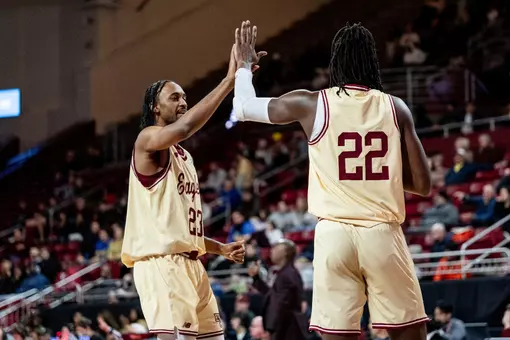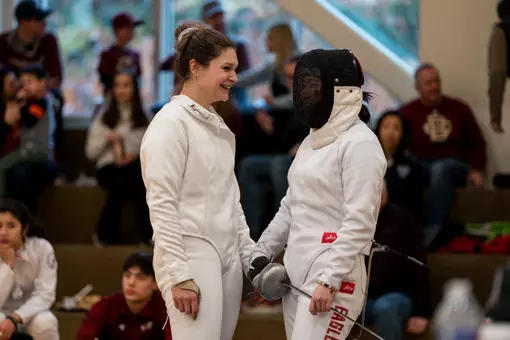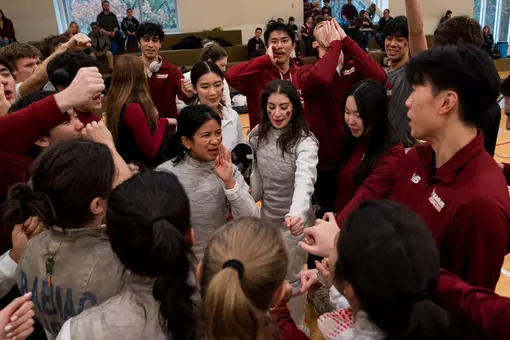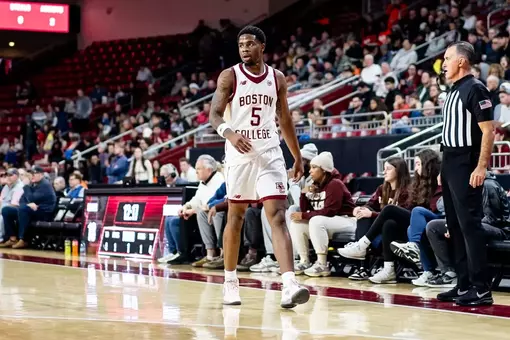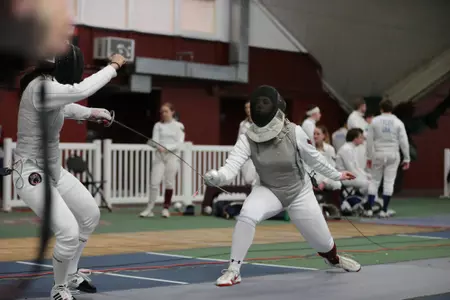
En Garde For BC
March 22, 2017 | Fencing, #ForBoston Files
Renee Bichette and Ethan Grab will compete in the NCAA Championships this weekend.
Every NCAA student-athlete strives to be the best at their craft. In Division I, the truly elite rise to the top, and the cream of the best earn immortality through their competition. Of those elite, the absolute best programs are there, year in and year out, competing for glory.
For Boston College fencing, that's something that drives their athletes. In a grassroots-type program, two Eagles - senior Renee Bichette and junior Ethan Grab - are giving their team that high level of success. This week, they'll compete as part of the epee discipline at the NCAA Championships.
"It feels great to qualify for the nationals," Grab said. "For me personally, I came back from an injury last year, and I had to watch my teammates compete. It made me want to succeed that much more, and now I feel like I'm making up for lost time on the strip."
"It absolutely is great," Bichette, who will make her third appearance at the national level, said. "The northeast region is so different because we have so many great programs (up here). For example, we compete against fencers from a school like Columbia, which is No. 2 in the nation in both men's and women's fencing. And it's such a rowdy atmosphere that it's so different from dual meets."
Qualifying for the competition is the result of a long season spent training in a combat sport. Fencing is comprised of three different disciplines - epee, sabre, and foil. The epee is the largest and heaviest sword in the sport and is the only one allowing for touching on the entire body. It has its own unique technique which requires its own form of training.
At the college level, it's a first-to-five touches for a victory in a bout. That creates an atmosphere where "the first touch is crucial," Grab said. "Fencers need a lot of intensity coming out to get that first touch because five touches can be over in an instant."
The individuals training in their discipline then comprise their team competitions, making for a unique atmosphere where both individual and team results take on equal importance. The Eagles participated in dual meet events throughout the season before competing in the ACC Championship in February. That led to the March 12th NCAA Northeast Regional held at Yale, where fencers from the most competitive region in the nation attempted to earn a trip to Indiana for this year's national championship.
"We have a variety of dual meets which creates a strong strength of competition," head coach Syd Fadner said, "and the ACC Championship is very tough. We fenced teams like Harvard and St. John's this year, which are very strong programs. Those meets contributed to placement at Regionals - which is what everything really comes down to."
The regionals are a one-day grind involving different pools. Fencers are seeded four different times and face off in round-robin format. For example, Grab found himself exempt from Round 1 but seeded into a seven-person pool in Round 2. After picking up three victories, he moved forward into a second seven-person pool in Round 3 that also included teammate MacGregor Mooney. After winning four more matches, he advanced to a 12-person final pool in Round 4, where he collected five victories and earned the right to fight for a national championship.
For Bichette, more than 10 victories in the Northeast Regional qualified her for the NCAA Championship for the third time in her career. It also sends her for a chance to improve on a program-best seventh place finish last season.
"I came into this season thinking our tournaments would be a breeze," she said. "So I put too much pressure on myself to keep getting wins; it backfired because I was in my head and when I started losing, it really impacted me. I realized that wasn't effective for the team, and I also realized at the peak of the season that I was ready to graduate. I realized I just wanted to enjoy the limited time I had left, have fun, and try my hardest - and that's when everything turned around."
For Grab, it's a little bit of a different story. Sidelined with an arthritis injury from a year ago, his training had to bring him back from the aforementioned season off.
"I knew technically what to do, but I wasn't sure how to push my body to its limits," he said of his return. "I approached everything this year seeing what my body could do, and then when I learned it, I just kept pushing. It was a roller coaster at the beginning, but as I started getting better and better, I got more comfortable and started to do what I expected myself to be doing on the strip."
"Renee's a warrior; she had to learn how to manage her emotions, and she's made huge progress," Fadner said. "She's learned how to reset and regroup in a bout, and she's gotten more consistency. Ethan was unable to fence last year, and he worked very hard to get back. He was very diligent to get back on the strip, and he's a tactician in his bouts. They both represent two different sides of the spectrum."
Now the duo heads to Indiana for a chance to become national champions against the best the nation has to offer for a program that isn't among the heavy national hitters. 24 fencers qualify in each weapon, so the duo will each engage in 23 bouts over a two-day event. "It's a gentler event because it's spread out over two days," Farber said. "The goal is to put together two good days; plenty of fencers have one really good day and one bad day, so they will need consistency. It's possible to lose five straight bouts and still finish in the top eight."
"I've fenced against almost everyone in my discipline that's at nationals," Grab said, "but at the same time, that means they've all fenced me as well. So we know what tactically we are going to do against one another. It's pretty crazy to think about a sport like fencing as a coin toss, but that's what it becomes."
"BC isn't as big of a program compared to some of the other teams," Bichette said, "but bigger teams don't translate to wins. This is the closest team I've ever been a part of; other teams compete with teammates, which I understand because it's very much an individualized sport. But we make teamwork part of the sport, and this team is my family. Other fencing teams don't have that aspect, and I'm excited to compete for this team."
"We take pride in doing the best that we can," Fadner said, "and our athletes are very proud to represent Boston College. They take responsibility for the program, and that creates the experience for them. There's a competitiveness to fencing here that takes an individual sport and balances it as a team. Our athletes do a good job at creating that atmosphere."
* The NCAA Fencing competition will run from March 23-26 at Indiana Farmers Coliseum in Indianapolis, Indiana.
For Boston College fencing, that's something that drives their athletes. In a grassroots-type program, two Eagles - senior Renee Bichette and junior Ethan Grab - are giving their team that high level of success. This week, they'll compete as part of the epee discipline at the NCAA Championships.
"It feels great to qualify for the nationals," Grab said. "For me personally, I came back from an injury last year, and I had to watch my teammates compete. It made me want to succeed that much more, and now I feel like I'm making up for lost time on the strip."
"It absolutely is great," Bichette, who will make her third appearance at the national level, said. "The northeast region is so different because we have so many great programs (up here). For example, we compete against fencers from a school like Columbia, which is No. 2 in the nation in both men's and women's fencing. And it's such a rowdy atmosphere that it's so different from dual meets."
Qualifying for the competition is the result of a long season spent training in a combat sport. Fencing is comprised of three different disciplines - epee, sabre, and foil. The epee is the largest and heaviest sword in the sport and is the only one allowing for touching on the entire body. It has its own unique technique which requires its own form of training.
At the college level, it's a first-to-five touches for a victory in a bout. That creates an atmosphere where "the first touch is crucial," Grab said. "Fencers need a lot of intensity coming out to get that first touch because five touches can be over in an instant."
The individuals training in their discipline then comprise their team competitions, making for a unique atmosphere where both individual and team results take on equal importance. The Eagles participated in dual meet events throughout the season before competing in the ACC Championship in February. That led to the March 12th NCAA Northeast Regional held at Yale, where fencers from the most competitive region in the nation attempted to earn a trip to Indiana for this year's national championship.
"We have a variety of dual meets which creates a strong strength of competition," head coach Syd Fadner said, "and the ACC Championship is very tough. We fenced teams like Harvard and St. John's this year, which are very strong programs. Those meets contributed to placement at Regionals - which is what everything really comes down to."
The regionals are a one-day grind involving different pools. Fencers are seeded four different times and face off in round-robin format. For example, Grab found himself exempt from Round 1 but seeded into a seven-person pool in Round 2. After picking up three victories, he moved forward into a second seven-person pool in Round 3 that also included teammate MacGregor Mooney. After winning four more matches, he advanced to a 12-person final pool in Round 4, where he collected five victories and earned the right to fight for a national championship.
For Bichette, more than 10 victories in the Northeast Regional qualified her for the NCAA Championship for the third time in her career. It also sends her for a chance to improve on a program-best seventh place finish last season.
"I came into this season thinking our tournaments would be a breeze," she said. "So I put too much pressure on myself to keep getting wins; it backfired because I was in my head and when I started losing, it really impacted me. I realized that wasn't effective for the team, and I also realized at the peak of the season that I was ready to graduate. I realized I just wanted to enjoy the limited time I had left, have fun, and try my hardest - and that's when everything turned around."
For Grab, it's a little bit of a different story. Sidelined with an arthritis injury from a year ago, his training had to bring him back from the aforementioned season off.
"I knew technically what to do, but I wasn't sure how to push my body to its limits," he said of his return. "I approached everything this year seeing what my body could do, and then when I learned it, I just kept pushing. It was a roller coaster at the beginning, but as I started getting better and better, I got more comfortable and started to do what I expected myself to be doing on the strip."
"Renee's a warrior; she had to learn how to manage her emotions, and she's made huge progress," Fadner said. "She's learned how to reset and regroup in a bout, and she's gotten more consistency. Ethan was unable to fence last year, and he worked very hard to get back. He was very diligent to get back on the strip, and he's a tactician in his bouts. They both represent two different sides of the spectrum."
Now the duo heads to Indiana for a chance to become national champions against the best the nation has to offer for a program that isn't among the heavy national hitters. 24 fencers qualify in each weapon, so the duo will each engage in 23 bouts over a two-day event. "It's a gentler event because it's spread out over two days," Farber said. "The goal is to put together two good days; plenty of fencers have one really good day and one bad day, so they will need consistency. It's possible to lose five straight bouts and still finish in the top eight."
"I've fenced against almost everyone in my discipline that's at nationals," Grab said, "but at the same time, that means they've all fenced me as well. So we know what tactically we are going to do against one another. It's pretty crazy to think about a sport like fencing as a coin toss, but that's what it becomes."
"BC isn't as big of a program compared to some of the other teams," Bichette said, "but bigger teams don't translate to wins. This is the closest team I've ever been a part of; other teams compete with teammates, which I understand because it's very much an individualized sport. But we make teamwork part of the sport, and this team is my family. Other fencing teams don't have that aspect, and I'm excited to compete for this team."
"We take pride in doing the best that we can," Fadner said, "and our athletes are very proud to represent Boston College. They take responsibility for the program, and that creates the experience for them. There's a competitiveness to fencing here that takes an individual sport and balances it as a team. Our athletes do a good job at creating that atmosphere."
* The NCAA Fencing competition will run from March 23-26 at Indiana Farmers Coliseum in Indianapolis, Indiana.
Players Mentioned
Men's Basketball: Le Moyne Postgame Press Conference (Dec. 28, 2025)
Sunday, December 28
BC Men's Hockey All-Access
Saturday, December 27
Men's Basketball: FDU Postgame Press Conference (Dec. 22, 2025)
Tuesday, December 23
Men's Basketball: UMass Postgame Press Conference (Dec. 10, 2025)
Thursday, December 11

